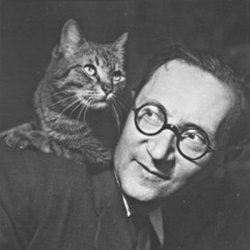




|
Jiří
Weil
(1900-1959)
Czech communist
writer, joined the Young Communists in 1921 and began
writing cultural articles for The Red Right, the CP
newspaper. The first to translate Mayakovsky to Czech, he
visited the Soviet Union for the first time in 1922, and
later from 1933 to 1935 lived in the Soviet Union as a
translator for the Comintern. In the later half of the
1930's he was expelled from the Communist Party for his
opposition to stalinism. A Jew, he was called up for the
"transports" in 1942 after living several years under the
brutal Nazi occupation. Refusing to go to his death without
resistance, he faked a suicide and spent the rest of the war
living clandestinely in apartments and other lodgings his
acquaintances could help him find. Stayed in Czechoslovakia
after the war. A radical writer, the spirit of resistance
permeates his works.
 Life
with a Star (1960): 270 pages. Based largely on Weil's own
experience as a Jew living under Nazi occupation. Having lived
through those horrific days, Weil describes Jewish Prague
vividly and realistically, a Prague that was destroyed by the
Nazis and has never returned. The main character, a leftist Jew
who is isolated from his comrades and the love of his life and
feels as if he has little to live for, as he sees Jewish Prague
and it's beauty being systematically destroyed. Yet as events
progress, he becomes convinced of the absolute need for
resistance, that one should always and forever resist, whatever
the difficulty involved and even if one has little to live for.
A passionate argument to never give in to injustice and
fanaticism, this beautiful, radical novel is a tribute to the
many Jews who resisted their fate, either armed or unarmed, in
big and small ways, to ensure the survival of many from the
fascist genocide.
Mendelssohn
Is On The Roof (1959): 228 pages. The novel's events take
place mainly in Nazi-occupied Prague. It deals with the struggle
of many different Jews to survive, some in hiding and others as
laborers for the Nazis. The novel also satirizes, somewhat
darkly of course, the racial idiocies and craziness of the
Nazis: people who would use their extensive cultural knowledge
in the interests of such things as removing statues to Jewish
musicians! It also clearly shows the reality behind the myth of
Nazi "efficiency": in reality the Nazi "machine" was very
inefficient and the terror it inflicted led subordinates to
exaggerate for no reason and often lie about accomplishments to
avoid punishment. A passionate novel calling for resistance to
fascism and oppression, everywhere and always.
|